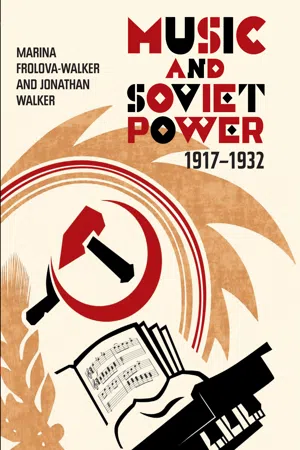
- 432 pages
- English
- PDF
- Available on iOS & Android
Music and Soviet Power, 1917-1932
About this book
The October Revolution of 1917 tore the fabric of Russian musical life: institutions collapsed, and leading composers emigrated or fell into silence. But in 1932, at the outset of the "socialist realist" period, a new Stalinist music culture was emerging. Between these two dates lies a turbulent period of change which this book charts year by year. It sheds light on the vicious power struggles and ideological wars, the birth of new aesthetic credos, and the gradual increase of Party and state control over music, in the opera houses, the concert halls, the workers' clubs, and on the streets.
The book not only provides a detailed and nuanced depiction of the early Soviet musical landscape, but brings it to life by giving voice to the leading actors and commentators of the day. The vibrant public discourse on music is presented through a selection of press articles, reviews and manifestos, all suppliedwith ample commentary. These myriad sources offer a new context for our understanding of Shostakovich, Prokofiev and Myaskovsky, while also showing how Western music was received in the USSR. This, however, is only half the story.The other half emerges from the private dimension of this cultural upheaval, traced through the letters, diaries and memoirs left by composers and other major players in the music world. These materials address the beliefs, motivations and actions of the Russian musical intelligentsia during the painful period of their adjustment to the changing demands of the new state.
While following the twists and turns of official policies on music, the authors also offer their own explanations for the outcomes. The book offers unprecedented access to primary sources that have been unavailable in English, or which lay unknown on archival shelves. Music and Soviet Power offers cultural history told through documents - both colourful and representative - with an extensive commentary and annotation throughout. MARINA FROLOVA-WALKER is Reader in Music History at the University of Cambridge and Fellow of Clare College, Cambridge; JONATHAN WALKER, who has a PhD in Musicology, is a freelance writer, teacher and pianist.
Frequently asked questions
- Essential is ideal for learners and professionals who enjoy exploring a wide range of subjects. Access the Essential Library with 800,000+ trusted titles and best-sellers across business, personal growth, and the humanities. Includes unlimited reading time and Standard Read Aloud voice.
- Complete: Perfect for advanced learners and researchers needing full, unrestricted access. Unlock 1.4M+ books across hundreds of subjects, including academic and specialized titles. The Complete Plan also includes advanced features like Premium Read Aloud and Research Assistant.
Please note we cannot support devices running on iOS 13 and Android 7 or earlier. Learn more about using the app.
Information
Table of contents
- Frontcover
- Contents
- Preface
- Acknowledgements
- Note on transliteration
- Chronology of Political and Musical Events
- October 1917–1918 Out of Chaos
- 1919 Depression and Fever
- 1920 Bureaucracy on the Rise
- 1921 Should I stay or should I go?
- 1922 Just Like the Old Days?
- 1923 The Birth of ASM and RAPM
- 1924 ASM in the Ascendant
- 1925 Equilibrium
- 1926 Guests from the West
- 1927 Celebrations
- 1928 At the Crossroads
- 1929 Velikiy perelom – The Great Turning Point
- 1930 RAPM’s Glorious Year?
- 1931 RAPM’s Fortunes Turning
- 1932 The Rules Change
- Key to Acronyms and Institutional Names
- Glossary of Names
- Bibliography
- Index
- Backcover